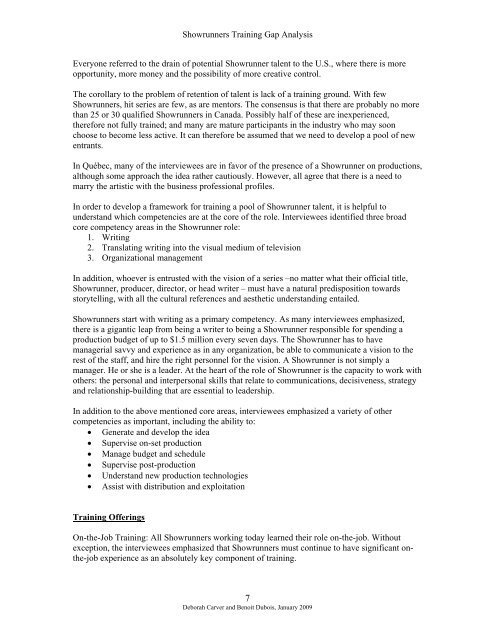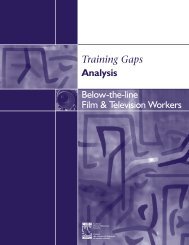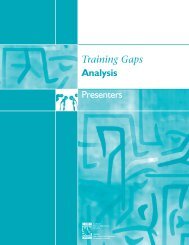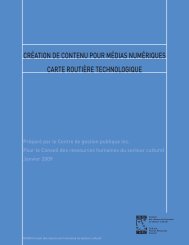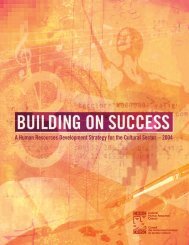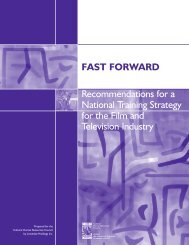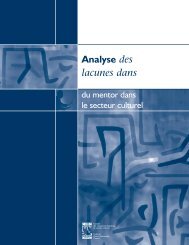Showrunners - Training Gaps Analysis - Cultural Human Resources ...
Showrunners - Training Gaps Analysis - Cultural Human Resources ...
Showrunners - Training Gaps Analysis - Cultural Human Resources ...
You also want an ePaper? Increase the reach of your titles
YUMPU automatically turns print PDFs into web optimized ePapers that Google loves.
<strong>Showrunners</strong> <strong>Training</strong> Gap <strong>Analysis</strong><br />
Everyone referred to the drain of potential Showrunner talent to the U.S., where there is more<br />
opportunity, more money and the possibility of more creative control.<br />
The corollary to the problem of retention of talent is lack of a training ground. With few<br />
<strong>Showrunners</strong>, hit series are few, as are mentors. The consensus is that there are probably no more<br />
than 25 or 30 qualified <strong>Showrunners</strong> in Canada. Possibly half of these are inexperienced,<br />
therefore not fully trained; and many are mature participants in the industry who may soon<br />
choose to become less active. It can therefore be assumed that we need to develop a pool of new<br />
entrants.<br />
In Québec, many of the interviewees are in favor of the presence of a Showrunner on productions,<br />
although some approach the idea rather cautiously. However, all agree that there is a need to<br />
marry the artistic with the business professional profiles.<br />
In order to develop a framework for training a pool of Showrunner talent, it is helpful to<br />
understand which competencies are at the core of the role. Interviewees identified three broad<br />
core competency areas in the Showrunner role:<br />
1. Writing<br />
2. Translating writing into the visual medium of television<br />
3. Organizational management<br />
In addition, whoever is entrusted with the vision of a series –no matter what their official title,<br />
Showrunner, producer, director, or head writer – must have a natural predisposition towards<br />
storytelling, with all the cultural references and aesthetic understanding entailed.<br />
<strong>Showrunners</strong> start with writing as a primary competency. As many interviewees emphasized,<br />
there is a gigantic leap from being a writer to being a Showrunner responsible for spending a<br />
production budget of up to $1.5 million every seven days. The Showrunner has to have<br />
managerial savvy and experience as in any organization, be able to communicate a vision to the<br />
rest of the staff, and hire the right personnel for the vision. A Showrunner is not simply a<br />
manager. He or she is a leader. At the heart of the role of Showrunner is the capacity to work with<br />
others: the personal and interpersonal skills that relate to communications, decisiveness, strategy<br />
and relationship-building that are essential to leadership.<br />
In addition to the above mentioned core areas, interviewees emphasized a variety of other<br />
competencies as important, including the ability to:<br />
• Generate and develop the idea<br />
• Supervise on-set production<br />
• Manage budget and schedule<br />
• Supervise post-production<br />
• Understand new production technologies<br />
• Assist with distribution and exploitation<br />
<strong>Training</strong> Offerings<br />
On-the-Job <strong>Training</strong>: All <strong>Showrunners</strong> working today learned their role on-the-job. Without<br />
exception, the interviewees emphasized that <strong>Showrunners</strong> must continue to have significant onthe-job<br />
experience as an absolutely key component of training.<br />
7<br />
Deborah Carver and Benoit Dubois, January 2009


